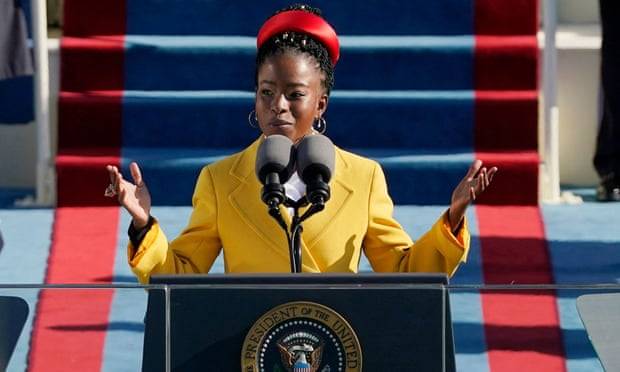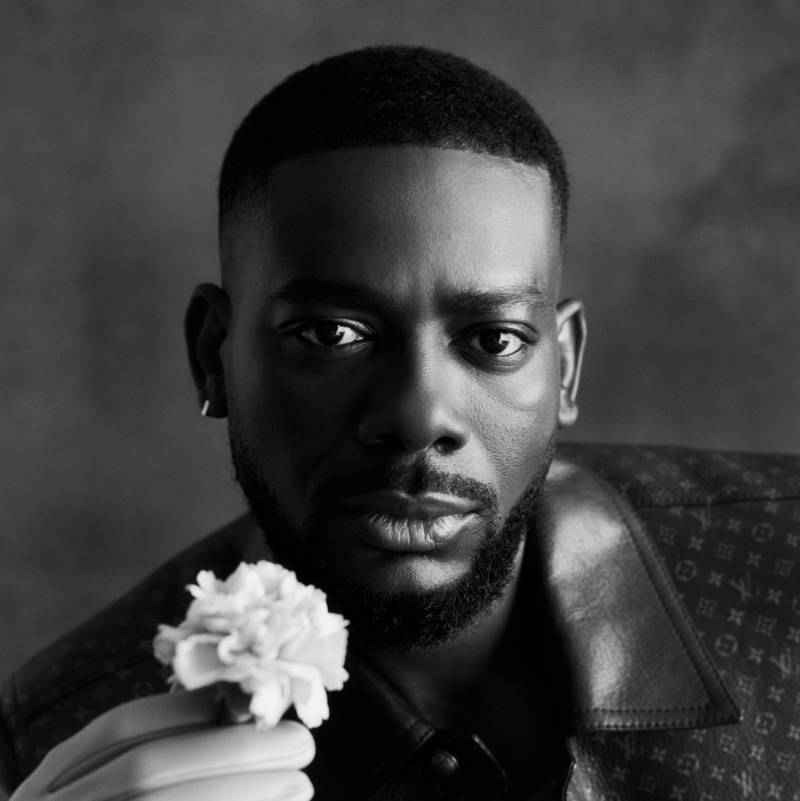What happens when words spoken on Capitol Hill make us shiver? Amanda Gorman’s luminous poem The Hill We Climb was addressed to Joe Biden and “the world”. Inaugural poems are a fiendishly difficult genre, attempted only six times since JF Kennedy’s ceremony. However, such “occasional” poems play an important cultural role, especially in our time when no public rhetoric and few common values can be taken for granted, as the poet addresses and repairs the damaged foundations of the state itself.
A soaring sense of history and solidarity pervades Gorman’s debut collection. Part elegy, part documentary record, and part witness statement, Call Us What We Carry is first and foremost “a letter to the world”, a phrase she borrows from Emily Dickinson. Like Dickinson’s, Gorman’s poetry puts immense pressure on our present moment, committing itself to an archaeology of our past and conservation of our future. It urges us to revisit the chequered history of intersectional injustices and re-evaluate our fragile species, systems and planet, engulfed by the pandemic, personal grief and public grievances.
“What happened to us”, Gorman writes, “Happened through us.” One of the most haunting things about her book is its retreat from the first-person singular. “I” exists sparingly, peripherally. By contrast, the all-inclusive trio “we”, “us” and “our” occur more than 1,500 times in her shape-shifting poems, a rare feat in the age of overwhelming selfhood. Gorman’s affirmative choric we echoes Martin Luther King’s memorial dream and John Lennon’s utopian lyricism, but her music also draws on the new dimension opened up by trailblazing poets such as Elizabeth Alexander, Anne Carson and Tracy K Smith. She challenges Walt Whitman’s “I am large. I contain multitudes.” In her book, it is we who contain multitudes, and a shared vision, grief and responsibility, as she affirms that “This book is awake. / This book is a wake. / For what is a record but a reckoning?”
Indeed, Call Us What We Carry is wide awake to the complex strata of human history and restlessly original in its poetic form. In a poignant sequence, The Soldier (or Plummer), Gorman excavates archival materials to repossess the voice of Corporal Plummer, an African American who served in France in the first world war during the Spanish flu. Superimposing her typewritten words on to the scanned, empty pages of Plummer’s diary, Gorman evokes racial discord, military violence and the “loaded silence / of coughing”.
In addition to keeping history alive, Gorman puts her finger on the pulse of the current pandemic, reporting on the ground the subtle changes in human sociability brought about by our new age of anxiety. Mapping “each sneeze & sniffle”, she notices that “Every cough seemed catastrophe, / Every proximate person a potential peril”. As the world counts deaths and we withdraw into ourselves, Gorman challenges the pervasive narrative of erasure and focuses instead on the power of collective memory. Her poems loosen up a centrifugal elegiac force surrounding the individual and insist on bringing us closer together, as she notes that “Some distances, if allowed to grow, / Are merely the greatest proximities.”. On the politics of mask-wearing, for example, her quietly engaging lines describe our ultra-fine facial movements when smiling behind masks; how we “Scale up our cheeks, / Bone by bone, / Our eyes crinkling / Delicately as rice paper”. She concludes that “Our mask is no veil, but a view. / What we are, if not what we see in another.” This is poetry rippling with communal recognition and empathy.
Her poems allude to multilayered sources: we find Rihanna, Drake, Shakespeare, Homer, Plato and health economics data
In Monomyth she remoulds another medium, a heroic epic on Imax, turning the pandemic and tail end of Trump’s presidency into a saga of irresponsibility and disaster, scripted with the satirical precision of Armando Iannucci or Michaela Coel. Gorman is an erudite absorber, resister and recreator of vocal, textual and etymological legacies. Without being overburdened by references, her poems allude to multilayered sources. We find Rihanna, Drake, Shakespeare, Homer, Plato, health economics data, a Dictionary of English Etymology, and the 1882 Chinese Exclusion Act. As she says, “Heritage is passed not in direct recollection but through indirect retelling.”
Directly and indirectly, grief as ubiquitous as light holds Gorman’s book together. “Grief commands its own grammar”, she writes. In addressing “the pain both private & public”, the book doesn’t overplay the language of trauma but seeks to heal and repair. Such a recuperative project risks being seen as consoling “wisdom literature”. Still only 23, Gorman is unafraid of grand words and gestures, but articulates loss and grief in a unique grammar that is self-aware without being inward. There is infinite jest and candour in the music of her wordplay: “America, / How to sing / Our name, Singular, / Signed, Singed.” There is also profound and rebellious meditation on contemporary culture framed across the book through the branching hierarchy of trees, in which the Darwinian metaphor is used to question the vertical organisation of our society when confronted by human inequality and climate emergency. “It is the carrying”, the poet claims, “That makes memory mutual”. In Call Us What We Carry, Gorman has written a mnemonic symphony of hope and solidarity in the face of the “vanishing meaning” of our time, speaking eloquently with “the lip of tomorrow”.
SOURCE : Guardian




